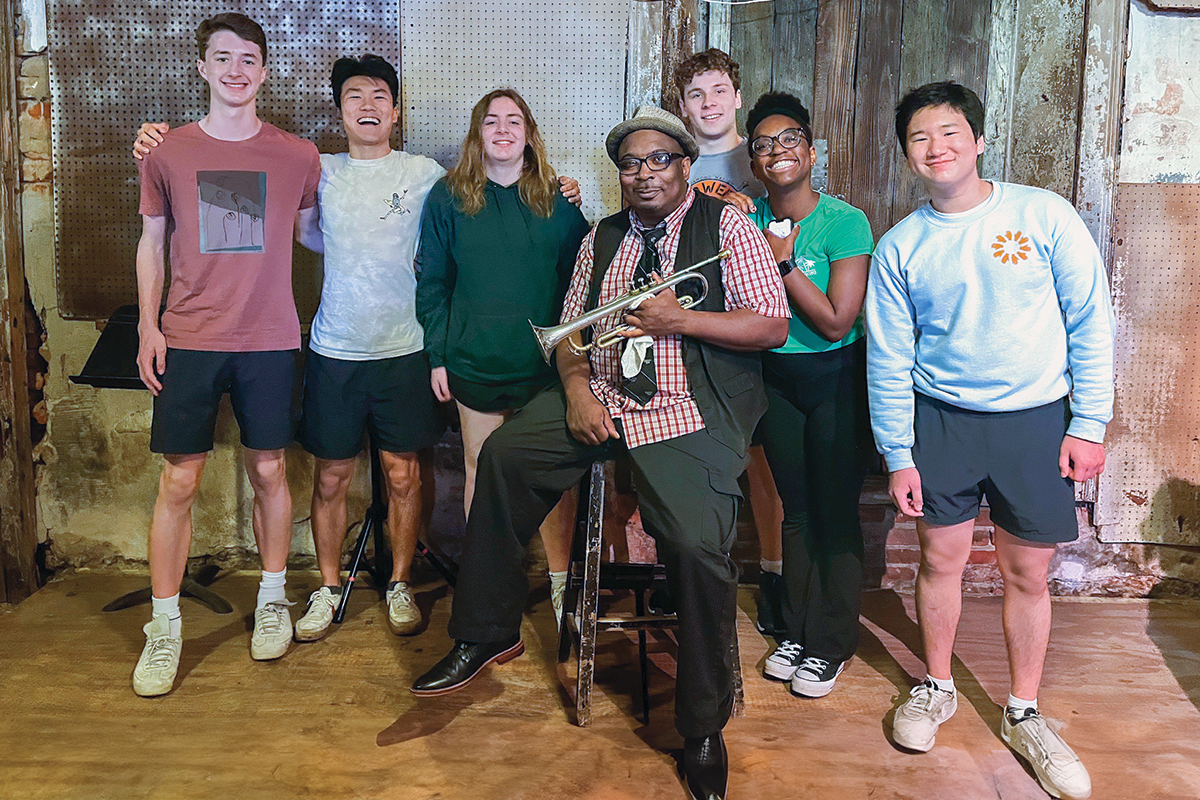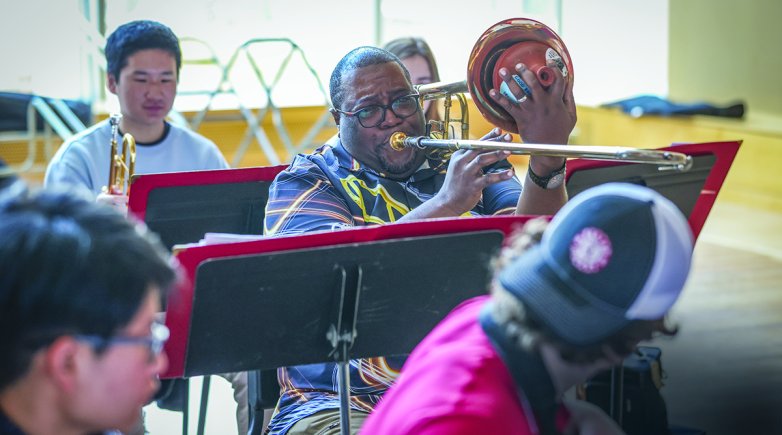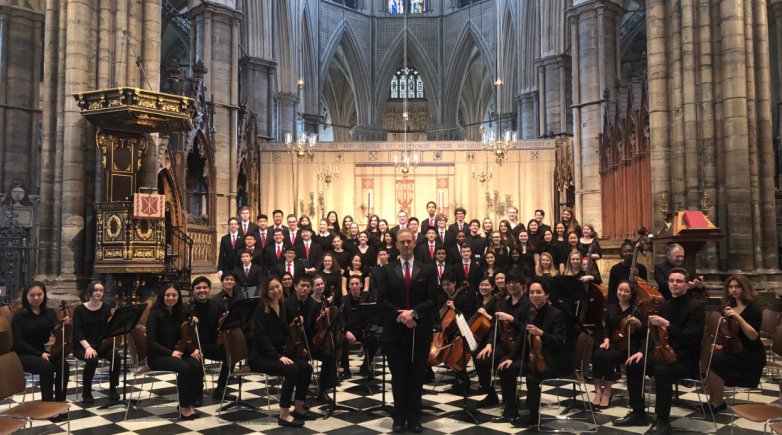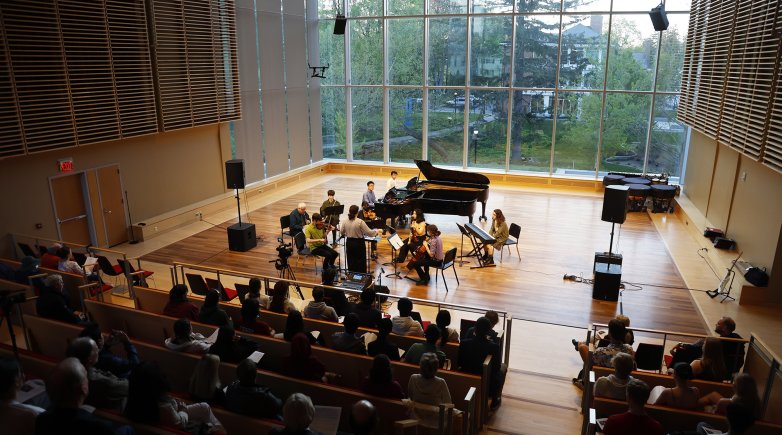Big "E"asy
Visiting Preservation Hall Jazz Band All-stars bring New Orleans music center stage.
A warm, brassy timbre spills out of Assembly Hall, echoing down the Academy Building corridors to welcome arriving students, helping them shake off the chill of a frigid February morning. On stage, far removed from their usual off-Bourbon Street haunt, the Preservation All-Stars sail through a handful of jazz standards, pausing only briefly to set up the next number.
“This is an old song,” band leader and trumpet player Kevin Louis says in a Southern croak before the group launches into the up-tempo tune with a call-and-response chorus. “It’s called ‘Down to New Orleans.’ It’s perfect to think about because y’all got this cold weather.” The refrain, “Why don’t you go down to New Orleans?” was prophetic for some in attendance. The Academy’s jazz ensemble returned the visit in March to perform throughout the Crescent City and watch the group play at their musical home, Preservation Hall.
Founded in 1961, Preservation Hall has become a landmark in New Orleans’ French Quarter neighborhood. The space, and its band, a rotating roster of dozens of performers, has become synonymous with the New Orleans jazz sound.
Operating as a six-piece setup on this morning, the group closes the set with a second-line recessional, a free-wheeling, upbeat jazz style commonly performed in a parade as part of funerals within Black communities of New Orleans. The music continues as students bound toward their next engagements.
A short time later, the musicians proceed to the Forrestal-Bowld Music Center where they sit in with the jazz ensemble under the direction of Music Department Chair Marcus Rabb. The session starts as most in “The Bowld ” do with a cacophony of tuning instruments. The Preservation All-Star Ronell Johnson hits some high notes on the trombone in “The Bowld.” All-Stars find seats among the students as Rabb sets the tone for the class period.
“So today, we’re just going to play some tunes,” he says, “and if at any point our visiting friends want to chime in, they can do that.”
It’s the last rehearsal before the jazz ensemble’s winter concert and the All-Stars’ presence and guidance provides an extra level of excitement. “They’re tired of me,” Rabb says with a smile.
Sheet music pages turn in unison and with a “one, two, ah one, two, three, uh” the ensemble launches into Milt Jackson’s “Reunion Blues.” After one run-through, Rabb pauses to work with the saxophone section on the song’s signature riff. All-Star saxophonist Clint Maedgen jumps in and wails through the notes on repeat. “You see where he’s putting those accents?” Rabb bellows as he motions for the students to join in. Mari Watanabe uses the momentary break to instruct Elaine Qiao ’25 on the piano. “You have to feel,” Watanabe says. “Blues is more one phrase, don’t cut with the measure.”
As classes elsewhere in the music building begin to let out, a crowd forms in the large doorway leading into “The Bowld” before people eventually spill into the room and the audience seats. With an eye on the clock, Rabb tries to close out the period before he’s persuaded by the ensemble and onlookers to play through Jon Batiste’s “Freedom” once more. As the students begin packing up Rabb thanks the visiting musicians with a humorous proposition. “I’m going to need you all to enroll as 12th graders,” he says. “You can all live at my house.”
Sit in on rehearsal
Join the Preservation All-Stars as they visited Exeter and played alongside students at a Jazz Ensemble rehearsal.
The All-Stars’ residency is made possible by a fund established in 1998 by Jane and Clint Gilbert ’47 that supports students’ pursuit of music through lessons, providing instruments and the Gilbert Concert Series, which brings renowned musicians to campus for performance and instruction. In addition to their time with the students, the All-Stars play an evening show for Exeter community in a packed Bowld that ends with audience members dancing and swirling around the band. >> Watch the performance
Dream to reality
For Rabb, a jazz trumpet player, the group’s affiliation with the birthplace of the genre makes the connection extra special. “Preservation Hall is a community-based organization dedicated to preserving traditional New Orleans music,” he says. “It can’t be overstated that it’s one of the most important American musical institutions.”
After joining the Academy in 2021, Rabb dreamt of partnering with the All-Stars and taking Exeter’s jazz ensemble on tour to the Big Easy. “I figured it would take five to 10 years to have a group good enough to do that and we were able to do it in three,” he says. “The universe let me put my plan into action.”
The collaboration on this day and the students’ upcoming spring break trip to New Orleans is all part of Preservation Hall’s mission. “For us, that’s our goal, to pass this music on to the youth,” Louis says. He and his bandmates were impressed by the students’ level of musicianship and looked forward to hosting the ensemble.

“They’re going to break all their dietary restrictions; that’s first,” he says. “And I think they’re going to get the idea that the music is not really on the page, just the notes are on the page. But the music, the magic, that’s got to come from inside.”
In the break between winter and spring terms, Rabb, a team of chaperones, and 22 students traveled to New Orleans for a week performing and taking in the cultural sites of the city, including Preservation Hall. “You go into the small, wooden, many-times-flooded building, tucked into the middle of a street like any other, and you immediately feel the joy,” Will Simpson ’24 says about the Hall. “It feels like how people describe the Sistine Chapel or Notre Dame.” The drummer says he was inspired by the All-Stars in the exact way Louis had hoped. “These guys are insanely technically skilled, but they have the understanding that being so technically skilled allows you to spend all your energy being you, and playing in your voice.”
Editor's note: This article first appeared in the Spring 2024 issue of The Exeter Bulletin.



